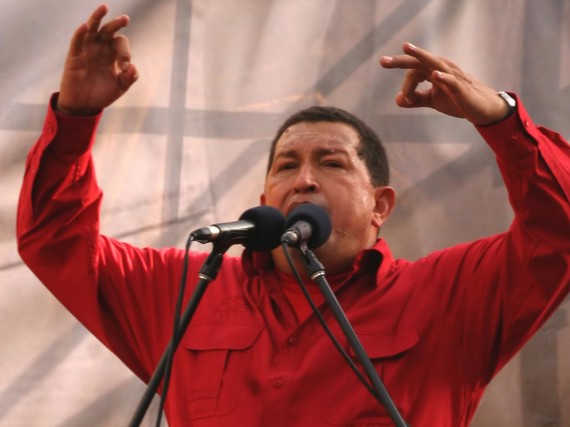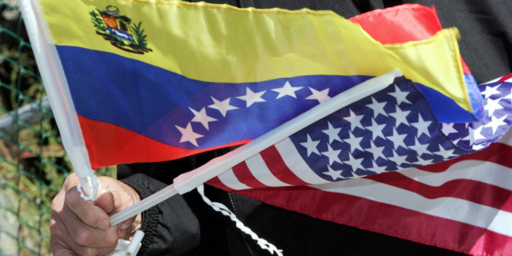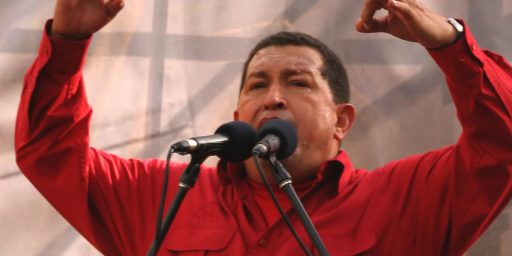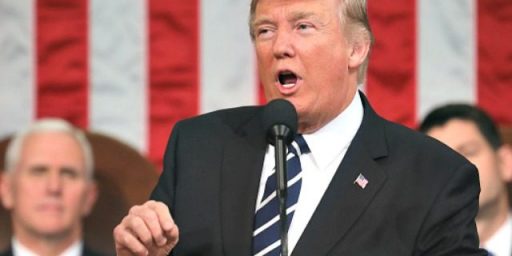Reaping the Harvest of the Failure to Institutionalize: Venezuela and Chavez
Hugo Chavez has built a state on cronyism.
 Business Week has an interesting piece on the current state of politics in Venezuela in the context of Hugo Chavez’s health problems and the pending presidential election: Chavez in Failing Health Turns to Generals to Defend Revolution.
Business Week has an interesting piece on the current state of politics in Venezuela in the context of Hugo Chavez’s health problems and the pending presidential election: Chavez in Failing Health Turns to Generals to Defend Revolution.
The piece notes that Chavez, who has had several secretive surgeries for an undisclosed cancer over the last year or so, is moving past military allies into positions of power in what appears to be an attempt to ensure that loyalists are in key position. The problem for Venezuela (well, at least one of them) is that cronyism is no way to arrange viable governing structures. Further, the fact that after so many years in power that Chavez feels the need to turn to old friends and allies with links to his failed coup attempt in 1992 underscores how little institution building has been undertaken over the last decade plus. There is no party. There is no real plan for what comes next. There is just Chavez. The regime is fueled by a combination of Chavez’s charisma and, well, oil revenues (pun partially intended).
In regards to the charisma, Michael Shifter of the Inter-American Dialogue (a policyoriented think tank that focuses on hemispheric issues) correctly noted in the piece: “Chavez can’t transfer his appeal and charisma to anyone else.”
Indeed. No Chavez, no chavismo. He is the Bolivarian Revolution and it seems that he has done nothing to fix that problem. Indeed, he had been acting like a man who thought he would live for several more decades and therefore would either a) deal with the lack of institutionalization later, or b) just let someone else deal with it later (much later). However, the cancer has changed the calculus. It should be noted that the issue is not just lack of an institutionalized party or organization, it is that chavismo isn’t a coherent philosophy nor is is based on an ideological model (or, really, any model at all). Rather, it is a vague and ad hoc set of notions that mix socialism, populism, nationalism, and whatever else Chavez wants to throw in at a given moment.
When a system of government is built largely around a particular figure, then that system tends to collapse when that figure leaves the stage. In other words: charisma and cronyism are poor materials from which to build stability and, indeed, are basically the opposite of institutionalization.
Such a situation also means that the charismatic leader is unlikely to leave power in an orderly fashion. Greg Weeks (a polisci professor and blogger) also was quoted in the piece:
“If he were to name somebody right now he’d be telling the world, ‘I’m pretty sure I’m going to die soon,'” said Weeks in a phone interview. “I see Chavez as pretending he’s healthy as long as he possibly can.”
As such, the likelihood of a regularized process of transition seems unlikely and that the mess of such a transition could come via a surprise and therefore foment a real crisis (i.e., if Chavez were to drop dead). Along those lines, Weeks noted that Chavez has had 7 vice presidents during his time in office (i.e., since 1999). That is not an approach that creates a smooth transition in case the president is no longer able to function in office. Indeed, it is more likely an attempt to avoid alternative centers of power to emerge.
There is no doubt that there will be substantial changes to governance in Venezuela once Chavez leaves the stage. However, the degree to which such a process is orderly or chaotic remains in question and the current situation is one that likely leans more to the chaos side (and one that is placing a great deal of power in the hands of military). There is also a real chance of serious internal power struggles as ill-defined centers of quasi-power seek to establish themselves in a post-Chavez circumstance. It does not bode well, at the moment, for the people of Venezuela.





Socialism, communism and all points in between never bode well for the unfortunate people who live under their respective boots. As far as despotism is concerned, the former and the latter tend to go hand in hand, whether in Venezuela, or in North Korea, or in Cambodia in the 1970’s, or in Cuba post-Batista, or in Central America, or of course in Stalin’s USSR.
Outside of Europe people hardly ever vote in socialism as national public policy. Normally it arrives at the point of a gun. Hard core communism never gets voted into office; always it arrives via bullets and blades. Even within places like Europe — a fading set of crazy quilted cultures still feeling the ripple effects of having lost millions upon millions of men in two world wars — when the disastrous effects of socialism as public policy finally hit home even weak-minded socialists vote in conservative governments to help right their collective ships.
Regarding Chavez, he’s nothing more than a thug with some oil money to burn. When he croaks the world will be a better place via the addition by subtraction principle. Granted, in Venezuela itself, post-Chavez, things might get a lot worse before they get any better. That’s simply endemic, however, to having a socialist thug in charge of things in the first instance. Various other countries in South America have gone through these binge and purge cycles. Hopefully in due course Venezuela will have a legitimate government that will allow the country to reach her full potential.
You seem somewhat regretful that the people of Venezuela might have tiniest opportunity to throw off the autocratic socialism and embrace democracy and freedom. I can see where it is bad for the cronies but the people as a whole would be better off.
While one can’t really disagree with any of this the fact is that the various governments that preceded Chavez were all equally dependant on cronyism…. and cronyism without the charisma. Chavez’s appeal extended far beyond charisma. He was originally carried to power by a reaction against an oligopolistic system of government that largely operated for the benefit of the wealthier classes in the country while vast numbers lived in dire poverty. After he’d been legally elected (no guns or blades) there was a failed attempt by the right to overthrow him in a coup that the US covertly supported and when it failed and Chavez bounced back to power stronger than ever he wasn’t very pleased with us and we as usual responded by going the demonisation route. Since you claim to be an expert on the area Steven, you must know all this just as well as I do. I’m not a particular fan of Chavez but he’s essentially a populist semi dictator not very different from the many like Peron who have preceded him and he still enjoys fairly massive support in the country.
@Tsar Nicholas II: “Hopefully in due course Venezuela will have a legitimate government”
In what way is Chavez not legitimate? He’s been elected and re-elected by the people of Venezuela and I’ve never really seen, heard or read anyone disputing the validity of those votes.
Again I ask, what is the deal with conservatives and Hugo Chavez?
Mike
@JKB: That is not the point. I do regret the mess that Chavez has made and the even bigger mess that is likely to come. It is not as simplistic a situation as you are making it out to be.
@Tsar Nicholas II:
As usual your ignorance never fails to amaze. There have been far more right wing military coups in South America than left wing ones. And as for the hardly ever….two words Brazil and Chile. In fact at a guess I’d say the majority of governments in south America are now legally elected and socialist in outlook. Would that be right Steven? Btw I know that Chile now has a moderately right wing president after a long period of socialist governments following the murderous right wing Pinochet military dictatorship ( just the sort you so much admire).
@Tsar Nicholas II:
You do know that Israel was led by socialists for the first 60 years of its existence, right? True, Israeli Labor party are Democratic Socialists, but they did build a society where over 60% of the economy was under state control.
Israel is not a lone exception. Sweden and India have been led by socialists for most of the post WWII era as well.
I think you are conflating one-man rule and cults of personality with “socialism.” The issue is institution building. The post-Mao Chinese Communist Party has done a magnificent job of institution building while maintaining a tight grip on power, so it has had4 uneventful major leadership changes Mao died.
@Brummagem Joe:
The old system ended up destroying itself, although the direct comparisons between the 1958/9-1998 system and that of Chavez (1999-present) is not as one-to-one as your description makes it out to be. The old system was, at one point, highly institutionalized. At a minimum, it was far less personalistic than the Chavez situation has been. When the AD and the COPEI (two major political parties) collapsed under the weight of their own corruption and policy failures, there was a state into which Chavez could walk (and yes, he was legitimately elected). If Chavez exits abruptly, the same situation will not be in place.
Indeed–I could go on at great length, but that really wasn’t the point of the post.
And yes, Chavez’s political style is very similar to that of Peron (of course, Peron was from a different time and place and it was eventually the military who asked him to leave).
@JKB:
Reading comprehension, JKB. Dr. Taylor is lamenting the lack of stable political/government structure that ensures a smooth power transition once Chavez passes on or is to ill to rule. His point being, because Chavez has created an allusion of stable power structure and not the real thing, it is the Venezuelan people that will suffer in the vaccuum to come.
@dennis:
My spelling is atrocious. Pardon me. “Too” and “illusion.”
@Steven L. Taylor:
So you agree they operated a system of cronyism. It’s one to one in that respect which was my point but just operates in the interests of a different set of people.
But he returned to power, died in office and passed power to his second wife who got overthown the second time by the military if I recall correctly. And the current Kirchner govt is Peronist/populist/socialist is it not?
@dennis: Exactly. Thanks.
@Brummagem Joe:
My point is that your description of pre-Chavez is a bit simplistic. (But then again, this is just a blog comment box). My cocern would be that those who are unfamiliar will assume the the pre-Chavez period was like the Chavez simply with different names. This would be a problematic interpretation, in my opinion.
Yes. In the early 70s. Isabel was actually his third wife (Eva his second). She was his VP and was a disaster and the military took over (which ended up being yet another disaster).
Yes, the Peronist party lives on, although the degree to which is represents the thinking of Peron himself is another issue.
@Steven L. Taylor:
Well I’m reasonably familiar and you laid a lot of emphasis on the cronyism of the Chavez system when in fact cronyism is nothing new in Venezuela. In his way I do think Chavez is something of an idealist.
Peron didn’t have any thinking other than staying in power as a populist caudillo very like Chavez which is why I mentioned him. The Peronist party remains a populist/socialist party and so continues to practice the same sort of statist populism brought up to date.
Cuba is also quite nervious about all of this. The cheap, to the point of being free, oil Chavez sends them each month has helped them recover from the havoc of the 90’s. A new leader who tell the Castro’s to pay fair market value won’t be looked upon kindly.
@Brummagem Joe:
Yes, well, but not all cronyism is the same, nor is all populism or, even, all Peronism (see Menem, Carlos Saul).,
My point remains: it is not that one cannot apply these terms in the various cases, but rather that it is that there are different (and vitally important) emphases that have to be made and other factors have to be taken into consideration when making said comparisons and evaluations.
Scary brown socialist. They can’t function without something to be scared of.
@Steven L. Taylor:
Of course it’s the same…..the beneficiaries may change but the process is unaltered….viz
Cronyism is partiality to long-standing friends, especially by appointing them to positions of authority, regardless of their qualifications. Hence, cronyism is contrary in practice and principle to meritocracy.
Cronyism exists when the appointer and the beneficiary are in social contact; often, the appointer is inadequate to hold his or her own job or position of authority, and for this reason the appointer appoints individuals who will not try to weaken him or her, or express views contrary to those of the appointer. Politically, “cronyism” is derogatorily used.
@Brummagem Joe: Yes, but there are issues of scope, source, and type. It is, to repeat myself yet again, problematic to simply try (as you seem to be doing) and compare two systems and say “both had cronyism and therefore the only difference between the two systems is who benefited.” It is simply more complicated than that. (Nor am I defining the Chavez regime solely in terms of cronyism–but rather, am pointing to it in recent actions and as part of a broader problem).
Quoting Wikipedia, by the way, (or any definition) is inadequate as argumentation.
If you are arguing that there was cronyism pre-Chavez, I agree. But then again, I doubt that there is a government on earth that doesn’t have some cronyism. Hence we have to look at other factors as well.
Help me out here: you like to get into these arguments over definition (and you usually seem to attach a grand implication to a given definition). What is the goal? (and I ask sincerely, as I am genuinely curious). Are you really interested in a back-and-forth? You trying to simply win the interchange? Thinking back to the argument we had over the term “military coup” in Egypt it seems that a) you like fairly straightforward definitions and b) don’t think much of my background (which seemed to peek out in one your early comments here “Since you claim to be an expert on the area Steven, you must know all this just as well as I do”). By the same token, I have seen you engage in similar arguments with others. So, again, what’s the goal?
@Steven L. Taylor: Indeed. By Joe’s logic, the State of Texas will collapse into anarchy after Rick Perry gets tossed to the curb.
@Steven L. Taylor:
.
Why?….is the definition incorrect?
No. You made a big deal about the amount of cronyism in the Chavez regime and I just pointed out that there was plenty of cronyism in Venezuela with previous regimes. Since then you’ve done a lot of dancing on a pinhead trying to suggest that there is some intrinsic difference between Chavez’s and earlier cronyisms. There’s none except in who are the beneficiaries. And your bit of amateur psychology couldn’t be more wrong. Most situations are very nuanced in my book as I tried to indicate with my comments about Chavez who to many Venezuelans is not the demon of popular US imagination. However, I do have something of a taste for intellectual rigor. And you’re being over sensitive about your background, I genuinely thought you were something of an expert on South America from something I’d read here.
@Gromitt Gunn:
And what logic would that be?
@Brummagem Joe: I was merely amusing myself at the state of my State’s government, since the alternative as a Texan is to cry.
Perry has been governor for so long that he has appointed every appointed person in the state government other than those positions specifically allowed to someone else – including those bodies with very highly staggered appointments (a decade-plus in rotation) like the UT System Regents, and it is an open secret in Austin that he’s been using various Business Enterprise funds to payback his friends via investing in their businesses.
@Brummagem Joe: Just trying to figure out where you are coming from. I am not sure that you actually helped me out there, ah well.
I am vexed, I must confess, as to how you acknowledge nuance, yet seem to frequently argue (as is the case here) from the position of a stark definition. I don’t see the nuance in your approach.
And no, not dancing on the head of a pin, but rather trying to identify importance differences.
What I note in the post, appointing individuals associated with the 1992 coup attempt to position of power is clearly cronyism. I further noted a general lack of institutionalization. How this can then be turned into “there was cronyism before, too” as if that provides some useful analysis.
Again, I noted above:
(and yes, that should be “concern”).
What I don’t get is that rather than address this point, you want to make it about cronyism and a Wikipedia definition at that. In regards to that: simply citing a definition is neither argumentation nor analysis. It is simply a definition.
Again: every government (and likely every business, too) has cronyism. That not the issue (nor is the basic definition of the term).
Also, when I tried to address you point about pre-Chavez Ven, I stated:
(Emphasis added.)
You then took that to mean “cronyism” (you responded: “So you agree they operated a system of cronyism”) yet noting corruption does not mean simply cronyism and you utterly ignored “policy failures.”
You may consider that dancing on the head of a pin, but I call it trying to identify (albeit briefly in a blog comment) the fact that there are multiple issues needing addressing in a discussion of 1958-1999 and 1999-2012.
One more thing, while I am thinking about it: a system of clientele networks linked to parties that distribute patronage, while it can fall into the definition of cronyism, is very different than a system of personal linkages to the president. This is a very different set of parameters between the old and current systems. Reducing both to simply “cronyism” is overly simplistic.
@Steven L. Taylor:
Steven, I don’t say Chavez’s regime is the same as those that preceded it. I pointed out the differences above. Chavez is a populist redistributionist with an authoritarian bent. However, on the narrow issue of the theory and practice of cronyism there no difference. I’m reasonably familiar with Venezuela having spent many years in the oil business so there’s nothing you can tell me about the cronyism and corruption that preceded Chavez and was indeed instrumental in bringing him to power. Will there be a vacuum of power when he departs? Quite possibly but it’s not pre-ordained. I suspect we’ll see some sort of collective leadership. And I think it’s you that’s oversimplifying things. I don’t think his departure means the automatic collapse of the Bolivarian revolution which was a reaction to the social inequalities in the country. I just don’t see the mass of the Venezuelans accepting a return to the pre Chavez order of things.
@Steven L. Taylor:
Except that it is the party in power that has control of patronage and since many of the regimes in SA are presidential that de facto mean links to the president or his party.
@Steven L. Taylor:
Btw Steven cronyism was central to your definition of the Chavez regime which is why I focussed on your use of the term… viz.
@Brummagem Joe: An oversimplification on my part, I will gladly allow.
If you’re going to talk about despotism in the 1970s, don’t forget to add Chile to that list, particularly after 1973, as well as Argentina, Nicaragua, Paraguay, Brazil, and Bolivia, among others…I imagine you don’t want to talk about what all those countries had in common…oh, and who knew that Batista’s Cuba was such a bastion of freedom…finally, equating Chavez with socialism is about the same as equating Pinochet with capitalism…
@Steven L. Taylor:
Honor is even!
(this was still on my phone from earlier: I thought it had posted). @Brummagem Joe: there are sort of two “lefts” in LaAm at the moment: the populist types (Chavez, Ortega, Humala, Morales, Corea) and a more pragmatic left (e.g., Lula and Rouseff in Brazil, Lagos and Bachelet in Chile in the recent past). Of course, a full explication would be a bit more complex than that.
The populists tend to emerge in less well institutionalized/underdeveloped situations. (which gets back to the theme of the post).
But to your point: two of the more successful cases of the last decade, Brazil and Chile have elected self-described socialists.
The above comment from Tsar about “socialism” demonstrates a very narrow understanding of the term.
@Steven L. Taylor:
To a substantial extent this is a reflection of the relative development of their societies. Brazil is a much more advanced country than Bolivia. And even Lula who while I agree was pragmatic engineered a substantial shift in resources to the poorer classes over his couple of terms.